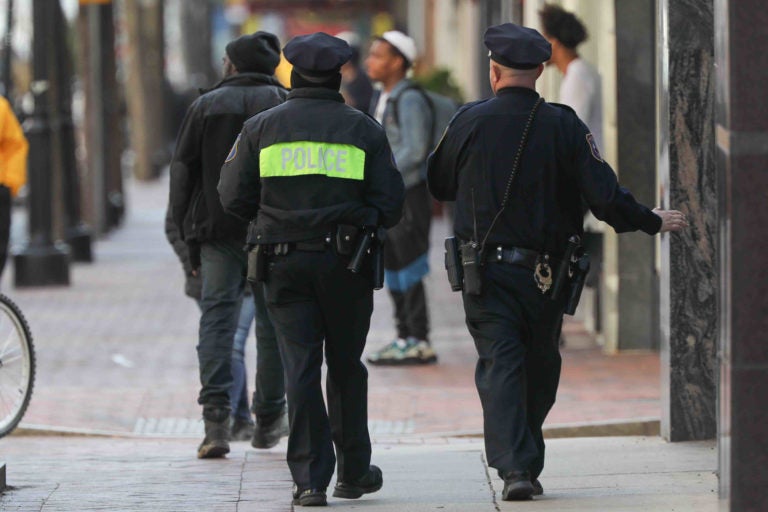Delaware task force starts work to improve police accountability
A group that aims for more police transparency and accountability talked about how the state’s Freedom of Information Act could stymie its efforts.

Police officers patrol Market Street in Wilmington, Del., on Thursday, March 26. (Saquan Stimpson for WHYY)
After multiple protests in Wilmington, Dover and elsewhere in the state earlier this year following the death of George Floyd at the hands of police in Minneapolis, state lawmakers created the Delaware Law Enforcement Accountability Task Force just days before the end of the legislative session in June.
Delaware has one of the most restrictive laws when it comes to keeping information about officers out of the public eye, said Rebecca Brown, policy director for Innocence Project, a group that works to exonerate people who have been wrongly convicted.
“It needs to be addressed given that liberty interests and the very integrity of the criminal legal system are at stake,” Brown said. “The Innocence Project strongly supports addressing the need for this foundational reform to increase police accountability and transparency.”
The task force includes a diverse mix of lawmakers, police, and representatives of groups that advocate for civil rights, racial equality, and criminal justice reform. The group is broken into subcommittees focused on areas including use of force, community policing, and transparency and accountability.
The group focusing on transparency and accountability held its first virtual meeting Wednesday morning. Subcommittee chairman Jim Liguori, a Dover attorney, told the other members he hopes to have a draft proposal ready for the full committee by mid-December. “We have the momentum, and we have this opportunity, and we do not want it to pass,” he said.
Liguori’s group will look at reforms to the Delaware Law-Enforcement Officers’ Bill of Rights, a proposed civilian review board of police conduct, and a disciplinary database that could be made available to the public to improve transparency. “Those three areas, I know they are very ambitious, and I think our charge can get them done. I just want to get it done in a systematic fashion.”
The group talked about the difficulty ahead in trying to make more information public about police discipline or complaints against officers due to the limitations imposed by Delaware’s Freedom of Information Act.
“While I think the disciplinary database is a great idea, the way the law is written, that isn’t going to be accessible without the law being revised to allow public access to that kind of information,” said Keith Steck, of the Delaware Coalition for Open Government.
Under the Law-Enforcement Officers’ Bill of Rights section of the Delaware Code, “all records compiled as a result of any investigation” of a police officer “shall be and remain confidential and shall not be released to the public.”
Charlotte King, founder of the Southern Delaware Alliance for Racial Justice, encouraged the group not to get too bogged down with what’s not possible.
“It seems to me, if we start this task force on the assumption of what we can’t do because of existing FOIA, we might as well stop right now,” she said. “We might have to recommend legislative change to FOIA to allow databases to allow other changes… But I personally am not interested in starting a process where we’re already putting up barriers.”
Next week, the Community Policing and Engagement Subcommittee will meet on Monday, followed by the Use of Force Subcommittee on Wednesday. Any legislative changes the groups recommend will have to wait until lawmakers return to session in January to see action.

Get daily updates from WHYY News!
WHYY is your source for fact-based, in-depth journalism and information. As a nonprofit organization, we rely on financial support from readers like you. Please give today.






